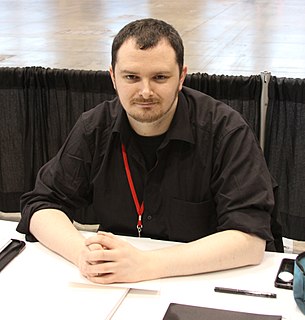A Quote by Rob Liefeld
My role as an artist helps me tremendously in breaking down each story. Pacing, layout, movement - having drawn a few thousand pages, I understand the language of comic books very well.
Related Quotes
"March" was inspired by "Martin Luther King and the Montgomery Story." I actually first heard about that comic from John Lewis, who told me that it played an important role in the movement. And so once he told me about that, it made me start thinking, "Well, why doesn't John Lewis write his own comic book?".
I try to weave a secret into each plot. It's the thread that holds the rest of the story fabric together. In fact, it's the reason for the story. I hint at the secret early on. Immediately I want the reader to get the feeling that something here isn't quite right. It helps maintain the suspense if a puzzling element is introduced in the first few pages of the book, but the answer isn't revealed until the final ones. Hopefully, readers want to know what the heck is really going on, and it's the desire to find out that keeps them turning pages.
Comic books sort of follow with the move - if people see the movie and if they're interested in the character and want to see more of the character, they start buying the comic books. So a good movie helps the sale of the comic books and the comic books help the movie and one hand washes the other. So, I don't think there's any reason to think that comics will die out.
It's like the query letter problem that I just mentioned, magnified a hundredfold. You might be good at telling a story, but that doesn't mean you know anything about marketing. Or layout. Or editing. Or publicity. Or selling your books for foreign markets.Everyone can point to a few examples of people that have done very well for themselves self-publishing. But honestly, those folks are lucky as lottery winners.
There's a page in #2 where I did one of the most interesting pages I've ever drawn. I had to think, "This is a big, blockbuster comic book." You're prepared to be more fan service-y or bombastic. Yet I did one of the most challenging pages I've ever drawn, and it was incredibly satisfying to do that on a project like this [All-Star Batman].
Writing something down and processing it, sitting with a text and a story, editing and rewriting new drafts - that entire process helps clarify something for myself. Depending on the person, the act of trying to tell your story helps you understand yourself better, helps you come to terms with something that happened.






































